On April 15, Boston marked the second anniversary of the Boston marathon bombing that killed three and injured over 250. A person with dwarfism, 3-ft-9-inch Juli Windsor and David Abel, director of the documentary ‘Chasing History at the Boston Marathon’ ran the race again in Boston 2014, for different reasons. This is their story
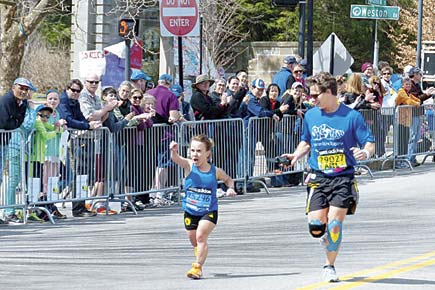
Juli Windsor, a runner with dwarfism, standing at 3 feet 9 inches, was just a little away from the finish line of the Boston Marathon in 2013, when bombs exploded in a terrorist attack ripping the heart out of Boston and stripping the Boston Marathon of its innocence forever. She was unable to complete the race and turned back like so many others.
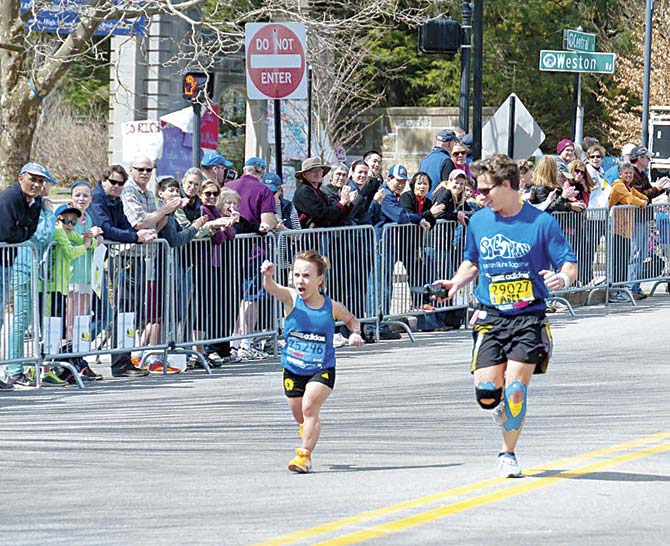
Juli Windsor and David Abel running in the Boston Marathon 2014
ADVERTISEMENT
It was a bitter disappointment, but nothing compared to the tragedy that had unfolded around her. Juli came back in 2014, to run again and became the first person with dwarfism ever to finish the race. It was a highly symbolic run in 2014, making a statement with other survivors. Documentary filmmaker David Abel who was making a film on Juli, also ran the Boston marathon with Julie in 2014.
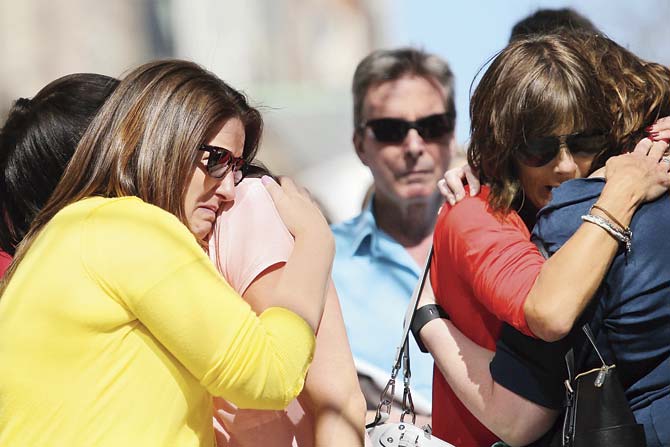
(L-R) Jenna Dziedzic of Boston, MA, Sabrina Dellorusso of Boston, MA, Linda Witt of Neenah, WI, and Jillian Boynton of Manchester, NH, react during a moment of silence at 2:49 p.m. ET near the finish line of the Boston Marathon on Boylston Street, commemorating the two-year anniversary of the 2013 Boston Marathon bombings, on April 15, 2015 in Boston, Massachusetts. Pic/Getty Images/AFP
Excerpts from an interview with Juli Windsor and David Abel:
Juli Windsor
Q. Was 2013 your first ever Boston marathon?
A. Juli: Yes, that was my first Boston Marathon but I was stopped half a mile from finishing due to the bombings. I returned the next year and completed the race in 4:43:26.
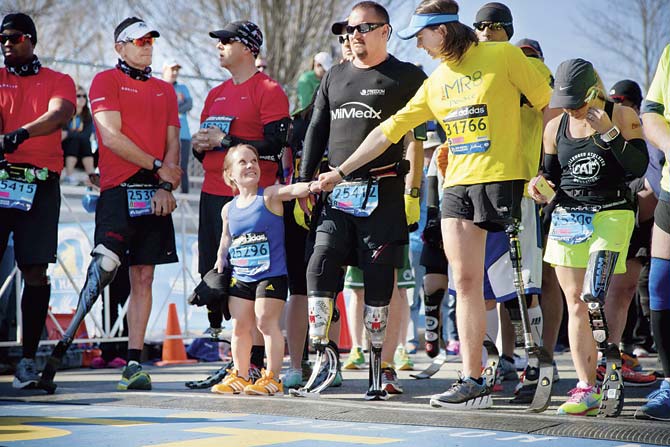
Juli at the start line in Boston with other runners. See how the others are missing a leg or feet
Q. What is your profession?
A. Juli: I am a physician assistant. A physician assistant is similar to an unspecialized doctor who works under the supervision of a specialist. I am licensed to diagnose, treat, and manage disease. I work at East Boston Neighborhood Health Center in the department of paediatrics.
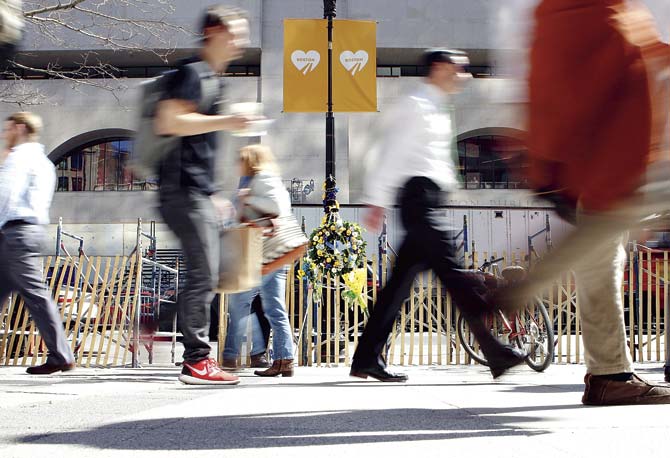
Q. What were the thoughts in your head at the start of the 2014 marathon? Runners have a great deal going through their minds at the start line...
A. Juli: Going back to the starting line in 2014 was a conscious decision of moral obligation and desire for justice. In light of the 2013 bombings, the Boston Marathon 2014 was a race that brought the entire city together, both runners and non-runners. When I started the marathon, I was excited to finish what I had been pursuing for years and felt honoured to be a part of something bigger than myself. The deliberate return of runners and crowds to the Boston Marathon 2014 did not erase the scars the city endured, but it reassured us all that we stand as one.
Q. Reactions of the crowd while you were running? Can you explain the atmosphere?
A. Juli: I was in the first heat of runners and literally led the pack for the first 10 miles. This in and of itself created an incredibly unique experience! People were already lined up to cheer on the runners. Many people recognized me from a running magazine I was featured in earlier that month and screamed my name. I had fun shouting back and getting people excited for the rest of the runners that followed behind me.
Q. Why did David Abel and you run in 2014?
A. Juli: David had started a film about me in 2013, and after the bombings he felt his film was incomplete. He continued following my story, as I had decided to return to the starting line in 2014. I was allowed one person to start the race with me, so I chose to have David run with me in order to experience first-hand what I was experiencing.
Q. It was 'co-lateral damage' claimed the bombers, Tsarnaev brothers, revenge for the US killing innocent Muslims through the war on Iraq and elsewhere. Any comments on this...
A. Juli: I think this is an important, but extremely complex issue, that I am unable to respond to in a concise manner.
Q. How has this changed you as a person...
A. Juli: Running changed me as a person early in life by teaching me endurance and perseverance through hardships. Running taught me to not quit, even if you come in last. It has also taught me the importance of community and co-depending on the friends and family in your life. Following the Boston Marathon bombings in 2013, the decision to return in 2014 was instinctive as a runner. There was no question in my mind that it was the right thing to do. This experience has not so much changed me as a person, but it has reinforced the characteristics I want to continue to cultivate in my life.
Q. As a person with dwarfism, is it more of a challenge, if so, in what way?
A. Juli: Dwarfism is a genetic bone growth disorder that affects the entire skeletal system. Along with short stature, people with dwarfism commonly have abnormal spines and/or joint problems. Running is a high-impact sport, so having abnormal anatomy can add stress and pain to the body and make it more difficult to run compared to the average runner. Additional steps are also required to cover the same distance given shorter leg length. Because of this, running a marathon for someone with dwarfism is closer to running nearly 50 miles because of the additional steps that are required.
David Abel
Q. Was this your first ever Boston marathon?
A. David: No, I had run Boston thrice before. I have lived in Boston for 15 years, though I’m originally from New York. I am a reporter at ‘The Boston Globe’ and have been for 15 years.
Q. What were the thoughts in your head when you started the 2014 marathon? Runners have a great deal going through their minds at the start line...
A. David: I just hoped I could keep up with Juli, who is quite fast. I almost didn’t make it to the finish line, when my calf muscles locked at mile 25.
Q. Reactions of the crowd while you were running? Bring alive the atmosphere?
A. David: It was euphoric and reverent at the same time. The crowds were all screaming, "Juli! Juli!"
Q. Why did both of you run in 2014?
A. David: For Juli, it was about finishing what the race she started and nearly completed in 2013. For me, it was about filming that and my own desire to cleanse the horror I witnessed on the finish line in 2013.
Q. It was 'co-lateral damage' claim the Tsarnaev brothers, revenge for US killing innocent Muslims through the war on Iraq and elsewhere...
A. David: There is no excuse for deliberately killing people who were standing near the finish line to cheer for other people, perhaps the most basic act of love.
Q. What did it feel like revisiting Boston marathon in 2014?
A. David: It was cathartic to finish the right way, with thousands cheering.
Q. What inspired you to make the documentary?
A. David: It was a pleasure to make this film, as Juli is irrepressible and amazing in so many ways. Juli’s comeback embodied the spirit of the Marathon, her strength, her courage, and her spirit. She overcame a lot to get to the starting line twice, including fears of another potential attack in 2014. I wanted her story to be told properly, with the right ending, and I wanted people to appreciate what she and so many others in our city experienced as a result of the bombing.
‘Undaunted Chasing History at the Boston Marathon’ will air on BBC World News on April 18: at 8.40 pm April 19: 2.40 pm.
 Subscribe today by clicking the link and stay updated with the latest news!" Click here!
Subscribe today by clicking the link and stay updated with the latest news!" Click here!







